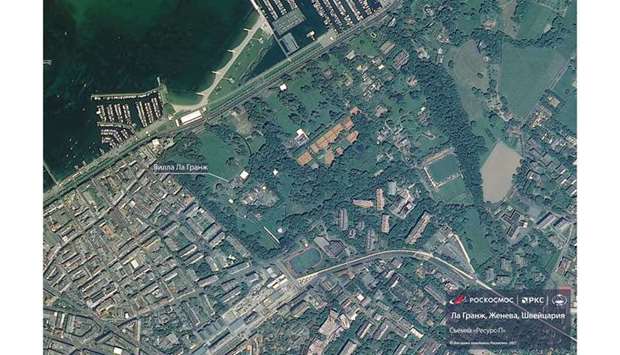The issues may be vexing, but the surroundings will be lush and serene when the US and Russian presidents meet today in a stately 18th century villa overlooking Lake Geneva.
The first face-to-face meeting between Joe Biden since he became US president in January and Russia’s Vladimir Putin could run four to five hours or beyond while they discuss arms control, cyber-hacking and election interference.
But in a sign of the strained ties, it will not include any meals and the two will hold separate news conferences rather than a joint one.
“No breaking of bread,” a senior US official told reporters as Biden flew to Geneva for the talks, scheduled to begin about 1pm (1100 GMT) in Villa La Grange, an elegant gray mansion set in a 30-hectare (nearly 75-acre) park.
Putin arrives first at the villa, where the two will meet Swiss president Guy Parmelin before starting their talks in the library, which contains historic leather-bound volumes, including works in Chinese, French, Persian and Turkish.
The authors represented among the thousands of books at the villa include Charles Pictet de Rochemont, a Swiss diplomat who prepared the Swiss declaration of permanent neutrality — itself likely a factor in the choice of Geneva for the summit.
Meanwhile, Switzerland is mobilising a “titanic” security effort for the meeting, deploying around 4,000 police, troops and security personnel to guard the summit from all angles.
Geneva is well used to hosting heads of state visiting the United Nations and other international institutions in the Swiss city.
But such showpiece summits are rare and Switzerland is leaving little to chance for the encounter.” It’s an opportunity to show what we are capable of,” said Yvon Langel, commander of the Swiss army’s 1st Territorial Division.
For the summit, the waterfront and Lake Geneva itself will be entirely sealed off within the city centre, while airspace will be closed.
The summit venue, the La Grange villa and its surrounding park, has been ringed with two kilometres of barbed wire-topped security fencing.
“We are at the dawn of a historic moment,” said Stephane Theimer, deputy director of the Swiss national police.
“The task of the Geneva police is titanic,” he told reporters outside La Grange ahead of the summit, calling it a “gigantic deployment”.
Around 2,000 police staff — 95% of the total Geneva police workforce — have been mobilised, backed up by 900 officers from elsewhere in Switzerland. The police in neighbouring France, a few kilometres away, are also on alert.
Around a thousand troops have also been deployed, while the Swiss air force will be policing the sealed-off skies for up to 50 kilometres around the city. Helicopters and fighter jets will be on duty.
However, Colonel Pierre-Yves Eberle, head of the air force operations centre, said the summit would not be buzzed with low-flying jets “unless we had a problem” with a suspect aircraft.
The army was stationing a battalion at the airport, while a surface-to-air defence system has been deployed.
Camouflaged soldiers with backpacks and automatic weapons have been on duty outside La Grange, while police sniffer dogs have been checking out vehicles parked near the perimeter.
Mobile military radar stations with spinning scanners have been deployed on the lakeside, normally the domain of ice cream eaters taking a stroll past the small boats moored along the waterfront.

A view shows the Parc de la Grange with the Villa La Grange ahead of today’s summit in Geneva in this satellite image released yesterday. The sign reads: u201cVilla La Grangeu201d. (Reuters)
